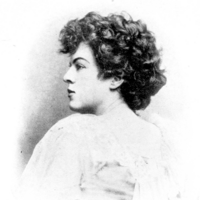The Beggar Maid
All on a golden morning the beggar maid did go
To gather branch and berry, the hazel-nut and sloe.
And as she went a-singing, a gipsy woman came
Beneath a bower of branches—a grey and withered dame.
‘Your fortune, pretty lady, I pray you stop and hear,
I tell of one who loves you, of child you will hold dear.
Cross you my palm with silver, for in your hand I see
That gold shall lie full often, so pity give to me.’
The beggar child made answer in laughter low and gay
‘Alack, you have mistaken, good mother, hie away;
I am no high-born lady, my fortune soon is told.
I wed some roaming fellow who hath nor land nor gold.
’My son—if God should bless me—a-seeking too must go—
To gather branch and berry, the hazel-nut and sloe.’
Then spake the gipsy woman and took her brown young hand,
‘Nay, you shall reign hereafter as queen of all the land.
’For see—the splendid future—that whispers of a throne—
And here the happy heart-line that owns one love alone.’
‘Good mother,’ said the maiden, ‘that love make true to be,
And I resign the kingdom—yet never owned by me.’
‘My daughter,’ said the gipsy, 'he’ll clothe you all in white,
And set you for your riding a palfrey black as night;
Upon your hair so yellow, a jewelled crown shall shine,
And gold shall be your wine cup and ruby red your wine.’
‘My throne it is the mountain, my wine the running streams,
Such things as power and glory are only sweet in dreams;
Good mother,’ said the maiden, ‘I pray you let me go,
For I must gather brambles, the berry and the sloe.
’You meet me but with laughter, a beggar maid am I,
Who have no greater kingdom than bird that wings the sky;
But like him I go singing who have no wealth to care
None comes her way to envy whose treasure-house is bare.’
And as she spoke a horn blast came ringing through the wood,
She raised her leafy burden—a timid moment stood;
‘Hush, ’tis the King Cophetua, a-hunting he doth go—
And I must gather berries, the hazel-nut and sloe.’

